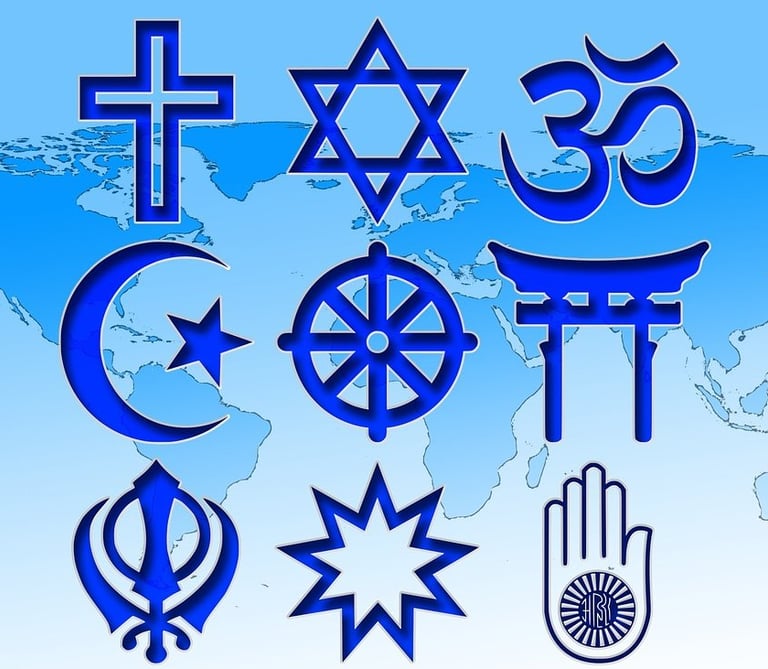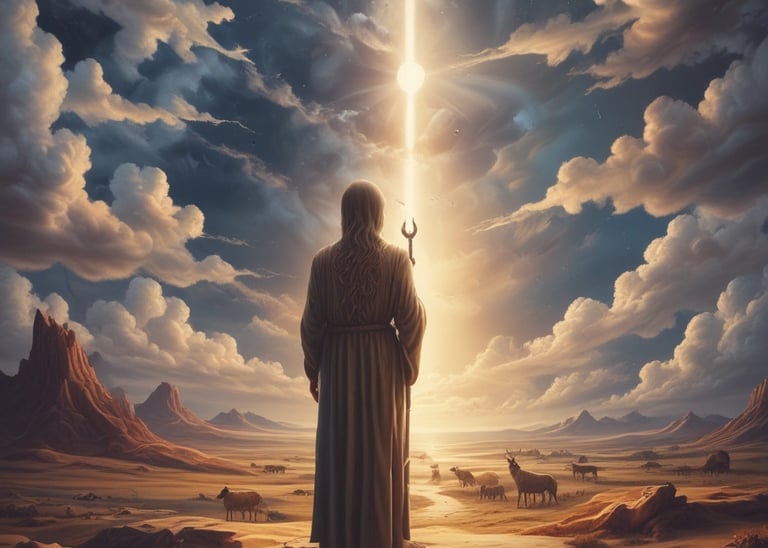Does God Exist?
Nobody on Earth Knows
(fact)
Possible? We'll never know. The mystery surrounding the existence of a higher power has fueled countless narratives throughout human history. While some stories may seem whimsical or entirely fabricated, they often reflect deeper truths and motivations of those who create them. Ultimately, the overarching reality is that no one on this planet can definitively prove the existence of God, nor can they claim to comprehend divine intentions, purposes, or plans. When individuals or groups state otherwise, it is important to approach such claims with skepticism, as they rely on beliefs rather than objective truths. These tales, born from human imagination, serve various purposes—some intended to inspire and uplift, while others may seek to manipulate or control. In grappling with these complex themes, we must remember that much of spirituality remains a mystery, inviting us to explore.
Consider the Bible, a text shrouded in mystery regarding its authorship, has long been held by Jews and Christians as the divinely inspired word of God. Yet, its early applications reveal a more pragmatic and institutional motive; it was often wielded as a tool for social control. Clergy and rulers exploited its narratives to maintain dominance, amassing considerable power and wealth at the expense of the broader population. This intricate relationship between spirituality and authority demonstrates how sacred texts can be manipulated, transforming divine messages into instruments of oppression. Thus, the Bible serves as a compelling example of how religious beliefs can intersect with political agendas, shaping societies in profound and often troubling ways. People have committed far more evil acts in the name of God than in the name of Satan. While many revere the Bible as a source of moral guidance, its history reminds us that interpretation can vary widely, influenced by those who hold authority.
Over the centuries, various organized religions have emerged, each claiming insight into God's will. These faiths often begin with a charismatic leader who undergoes a transformative divine experience that shapes a new doctrine. For instance, Muhammad speaks with God, Moses receives sacred tablets, and Jesus is regarded as divine. Similarly, Joseph Smith discovers golden plates as revelations, while Confucius, despite not proclaiming to be a deity, is venerated in a similar vein. Core tenets of these religions are meticulously documented in sacred texts, offering guidance on ethical living, the afterlife, and the consequences of deviating from established rules, providing followers with a framework to navigate their spiritual journeys. Some examples of these texts would include:
Buddhism: Scriptures called “Sutras” and other educational texts
Christianity: The Bible, which includes the Hebrew Bible and the New Testament
Confucianism: The Analects of Confucius
Hinduism: The Bhagavad Gita, Vedas and the Upanishads
Islam: The Qur'an
Judaism: The Tanakh, or Hebrew Bible
Later Day Saints: Book of Mormon
Scientology: Scriptures are a series of documents written by L Ron Hubbard
Sikhism: The Guru Granth Sahib
Spiritism: The Five Fundamental Works of Spiritism
Each professes to know the truth and many infer they are the one true religion. Yet the differences between them are many and often they conflict with each other. We cannot say if any one of them are right or any one of them are wrong in their beliefs. All have an equal chance of getting the story right. If there were actually one true religion that could prove God exists and prove they know God’s will, there wouldn’t be a need for any other. If any of these religions could produce a rational argument that came anywhere close to proving there was a God, that described God's will, social media would light up all over the world within minutes and masses of people would be transformed overnight.
Fundamental problem is -- they were all written by mankind. All are stories, made up without a foundation in truth or fact. All you need to do is look at how the documents were originally used to control the masses and create power and wealth for a very few.
If we were to hypothetically erase all human knowledge and eliminate every text on religion, mathematics, physics, and science, the outcomes would differ significantly when it comes to the revival of these fields. Mathematics, physics, and science are grounded in empirical evidence and universal truths; thus, they would inevitably be rediscovered and documented in much the same way we understand them today. Their principles can be validated through experimentation and observation, ensuring their inevitable return as a cornerstone of human knowledge. In stark contrast, religion, which relies on narratives and subjective beliefs, would manifest in entirely new forms. Lacking a foundation in verifiable facts, the stories and doctrines would evolve according to the cultural and historical contexts of their creators. In this scenario, the revival of religion would be a reflection of human imagination rather than established truths, highlighting the distinction between empirical knowledge and faith-based belief systems.
Unfortunately, no one can prove to you that God exists -- or doesn't. No one can tell you with any creditability at all that they know God’s will, how God wants you to live, and what rules you must follow. If they do, they want something from you. Your obedience, your money, or both.
We're not saying not to "believe" in God. Some do, some don't. Just understand that it's a belief and not a fact. But even though no one knows if God exists, obviously our lives, our world, the universe was created by something -- but what?


Does God Exist?
The question of whether a god exists is a profound inquiry that has captivated human thought for millennia. From the dawn of our species, as early humans gathered in the flickering light of cave fires, they pondered their origins and the cosmos around them. Imagine a young man, perhaps named Adam, envisioning a grand tale of a powerful being, dubbed “God”, who breathed life into all things. This notion not only offered answers to their deepest questions but also presented a path to leadership and influence in their community. By weaving a compelling story, Adam saw the potential to guide his tribe and shape their understanding of life, existence, and their place in the universe, forever altering the fabric of human belief and society. And a religion was born.


Suggested Searches
Note:
This website will barely touch the surface of certain complex subjects; Cosmology, Physiology, Physics, Quantum Mechanics that even today's scientists don't completely understand. Our intent is to present an overview of the relevant aspects of these topics and then provide suggested search topics so you can explore them to your level of interest and satisfaction.
© Copyright Fundamental Deist
